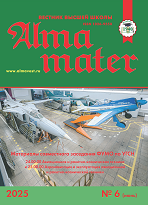UDC 37.01:37.04
https://doi.org/10.20339/AM.03-23.055
Evgenia V. Pchelintseva, Cand. Sci. (Pedagogy), Associate Professor of Department of Hospital Therapy at Ivanovo State Medical Academy, e-mail: Ksenn1@yandex.ru
The modern stage of the educational practice of preschool education is characterized by changes in the use of effective technologies that actualize the problem of psychological and pedagogical support for children who have been subjected to violent actions by adults. A retrospective analysis of domestic, foreign, historical, pedagogical, psychological scientific research determines the priority of the technology of correction of the consequences of child abuse, the basis of which is the synthesis of child psychoanalysis and modern conceptual provisions of the national child psychology of development. The structure of the presented psychoanalytic technology includes diagnostic, correctional and developmental, control and evaluation modules, the content of which reveals the individual typological characteristics of the child, taking into account the sensory, unconscious manifestations of the psyche, internal emotional experiences that are the consequences of violence. The diagnostic module is presented by the method of projective tests, questionnaires that allow to identify the determinants of traumatic events, factors of unfavorable passage of a child of a particular age stage of mental development. The content of the correctional and developmental module, the implementation of which provides for the organization of the playing space by the child himself, with the facilitating participation of an adult, is carried out using the following methods: playing cooperation of an adult with a child, communicative drawing, a co-lived event in a director’s game. The control and evaluation module is presented with a description of the evaluation drawing techniques that allow determining the dynamics of mental well-being of the individual. The presented technological correction tools are the most important components of the professional activity of child psychologists and teachers in working with children survivors of adult violence.
Keywords: child psychoanalysis, correction, consequences of violent actions, director’s play, child psychotrauma, psychoanalytic technology.
References
1. Abramenkova, V.V. Social psychology of childhood: Textbook. 2nd ed. Moscow: INFRA-M, 2018. 511 p.
2. Bozhovich, L.I. Personality and its formation in childhood. Moscow, 1968. 100 p.
3. Valkova, N.V. Domestic violence against children. Forms of child abuse. Problems of Science. 2020. No. 8 (56). P. 52–56.
4. Veselova, V.S. Values of modern society and education. Values and meanings. 2020. No. 2 (5). P. 64–73.
5. Wittels, F. Freud. His personality, teaching and school. Leningrad: EGO, 1991. 197 p.
6. Yesina, O.B. The influence of clinical and biological factors of early development on the clinical features of PTSD in children. Medical psychology in Russia. 2018. No. 5. P. 96–112.
7. Kazennaya, E.V. Modern foreign studies of post-traumatic stress disorder and its treatment by effective psychotherapeutic methods in adults. Electronic journal “Modern Foreign Psychology”. 2020. Vol. 9. No. 4. P. 110–119.
8. Pchelintseva, E.V. Theoretical Provisions of the Technology of Combined Correction of the Traumatic Experience of a Child Who has Experienced Adult Violence. Alma Mater (Vestnik vysshey shkoly). 2023. No. 2. P. 75–79. DOI: 10.20339/AM.02-23.075
9. Chegina, I.S. Investigation of the specifics of self-awareness and methods of psychological protection of older preschool children. Proceedings of the Samara Scientific Center of the Russian Academy of Sciences. 2009. No. 4-5. P. 1239–1243.
10. Elkonin, D.B. Selected psychological works. Moscow: Pedagogy, 2020. 560 p.
11. Yugova O.V. The influence of socio-psychological factors and the family environment on the mental development of a child. Psychological sciences, Sciences of education. 2020. V. 1 (61). P. 127–137.
12. Baldwin, D.S., Pallanti, S., Zwanzger, P. Developing a European research network to address unmet needs in anxiety disorders. Neurosc. Biobehav. Rev. 2013. Vol. 37. No. 10. P. 2312–2319.
13. Benedek, E. Children and psychic trauma: A brief review of contemporary thinking. In: Posttraumatic stress disorder in children / eds. S. Eth, R.S. Pynoos. Washington, DC: American Psychiatric Press, 1985. P. 1–16.
14. Bowlby, J. The making and breaking of affectional bonds. London, 1979. 235 р.
15. Bonanno, G.A., Field, N.P. Examining the delayed grief hypothesis across 5 years of bereavement. American Behavioral Scientist. 2001. Vol. 44. P. 798–816.
16. Myers, J. The Legal System and Child Protection. The APSAC Handbook on Child Maltreatment. N. Y., 2002.











.png)






